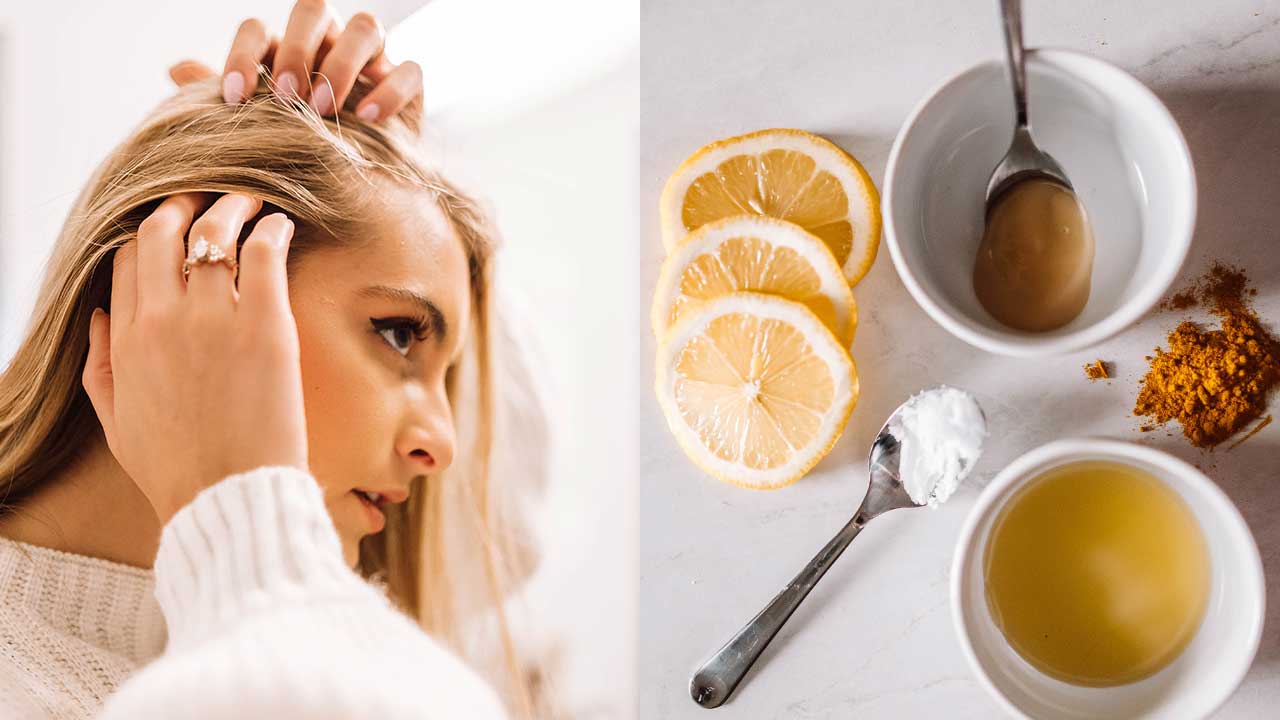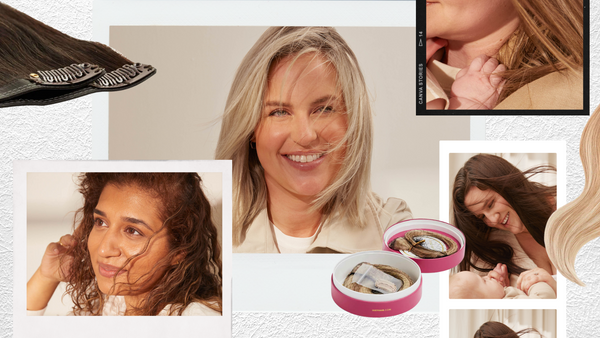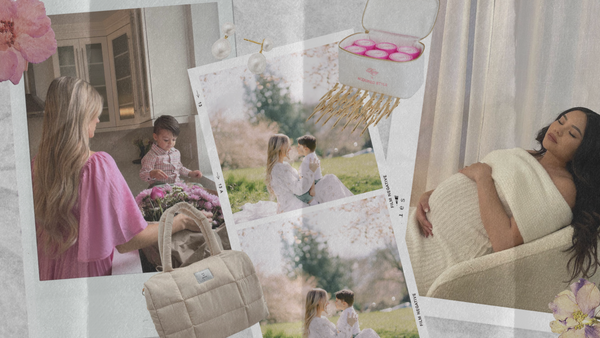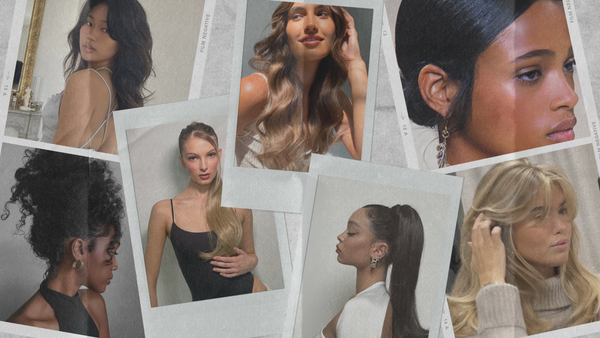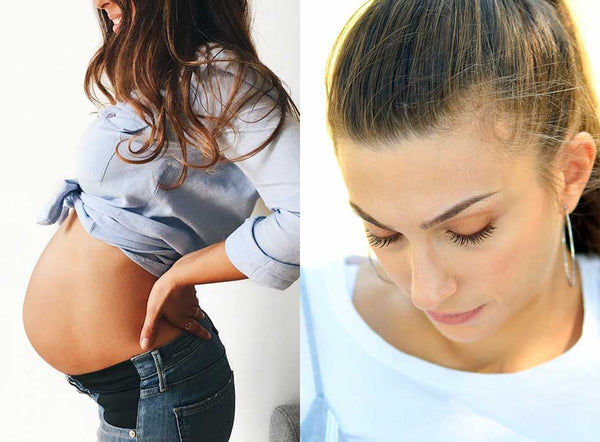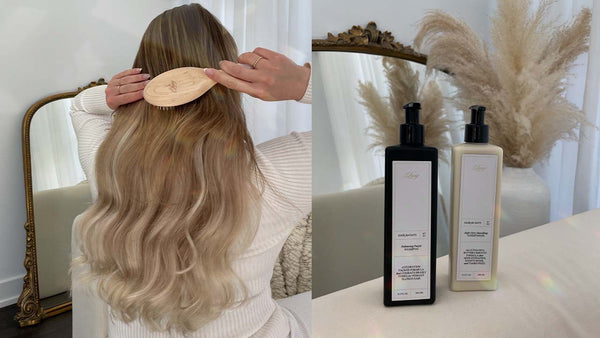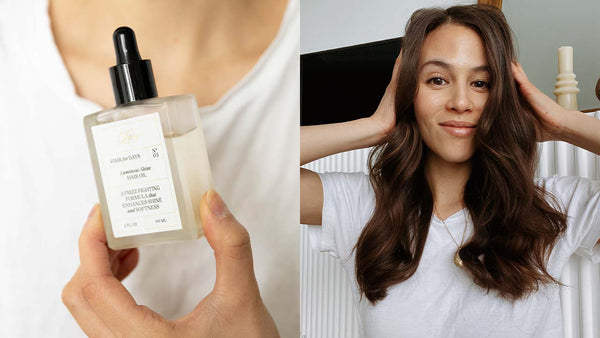Did you know that the average woman can lose up to 100 strands of hair per day?
Whether this shocks you or brings you comfort to know you’re not alone, hair loss is a very common occurrence for every woman. After all, between brushing, blowouts, and ponytails, we put our hair through a lot, but if you’re noticing more strands falling out, or thinning hair, it may be time to take a pause and look at your hair habits and overall health. There can be hidden causes behind hair loss that may not be immediately evident at first.

The causes of hair loss in women can be attributed to anything from genetics to hormones, medications, and over-styling or processing. A very quick and simple test to see how much hair you’re losing on average is to gather around 60 strands between your fingers and run through your hair. Health experts say about 5-8 strands of hair should fall out, anything in excess of 15 could mean you’re losing more than normal, but it’s no reason to freak out.
Our hair type and density is closely linked to our overall health, inherited genetics and our daily habits. By taking a holistic view on female hair loss it can give you a better understanding on how to prevent hair loss and keep your hair as healthy as possible.
Here are 10 hidden causes of hair loss in women, and some not often talked about reasons for why your hair may be falling out.

Causes of hair loss
1. Genetics and hereditary traits
Let’s start at the beginning—literally. We love to attribute our favorite features to our parents or grandparents and let’s face it, we also like to blame them for the ones we’re not always pleased with. Hereditary pattern baldness, or androgenetic alopecia if you want to get fancy, is more commonly known as male pattern baldness. Androgens are “male” hormones that have important functions for both sexes including the regulation of hair growth. It’s true that men undergo hair loss more frequently and earlier in life than women and how they lose their hair also differs. Men’s hairlines will usually recede in what looks like the letter “M” whereas for women, thinning or loss will usually occur at the crown of the head. It is estimated that 30 million women in the US experience female pattern hair loss.
This type of hereditary hair loss occurs in both sexes due to genetically-determined shortening of the hair’s growing phase (anagen), and a longer time between the shedding of hair and the start of growth or new anagen phase. This is the most common type of hair loss and for women, it usually occurs with age. Typically, most women will notice their hair thinning over time with a reduction of hair volume. Androgenetic alopecia is inherited but can also result from an overproduction of androgen.

How to treat inherited hair loss
There are medications or drugs on the market such as Minoxidil (Rogaine) that are usually available over the counter to help treat hair loss in women. However, there are side effects such as irritation in the scalp and possible hair growth in unwanted places such as the forehead or cheeks. It is certainly not for everyone, and women should always consult their health providers before taking any over the counter options. With those of us with genetically pre-determined hair loss, getting creative with styling (and not over-styling) can be enough. We can’t always fight time, but it’s important to note that while hair may have an impact on our self-image and confidence, physiologically, hair doesn’t have a large impact on the rest of our bodily functions.
2. Iron and vitamin deficiencies
A common and sometimes hidden cause of hair loss for women is a lack of iron. Iron deficiencies commonly occur if you have anemia, a condition that occurs when there are an inadequate amount of red blood cells to carry oxygen to the body’s tissues. Very heavy menstrual bleeding can also cause iron deficiencies. Iron is needed to help produce hair cell proteins and without it, thinning occurs, and we experience excess hair falls as a result.
A lack of the vitamin B12 can also impact hair loss and vegetarians and vegans are sometimes susceptible as B12 is commonly obtained through animal proteins. Vitamin B12 is closely linked to the health of red blood cells and can also leave people feeling low on energy when there is a deficiency.
On the other hand, an excess of vitamins can also be harmful. Vitamin A may appear to help hair grow faster, but when it is overused it causes your hair to reach its fall out point much faster than it would naturally. Unlike water-soluble vitamins, Vitamin A is a fat-soluble, meaning any excess could be stored in your liver which has further health consequences. The average person gets enough Vitamin A through a balanced diet, so an extra supplement should not be necessary.
How to treat iron and vitamin deficiencies
There are different severities of anemia and it is also a condition that can come and go. Depending on your health and the type of anemia, it can be treated with iron supplements. B12 is also available in supplement form and can be incorporated into your daily vitamin routine. Eating foods that are high in iron, B12, and zinc (leafy greens, beans, nuts, etc.), and incorporating protein-rich foods makes a huge difference in supporting the body’s protein—which hair is made of. It’s best to check with your doctor to determine if you have an iron deficiency before taking iron supplements, as an excess of iron can also cause serious problems such as constipation and upset stomach.

3. Pregnancy and postpartum hair loss
"Strong enough to bear the children. Then get back to business."
As the great Beyoncé proclaims in her hit song Run the World, women and their bodies are capable of beautiful miracles—pregnancy and childbirth are definitely high on the list. It is not uncommon for women to lose some hair after childbirth, and postpartum hair loss is most noticeable within the first two to six months but is typically temporary. It’s important to note that it doesn’t occur for every woman, nor does it happen with every pregnancy.
The body experiences higher estrogen and progesterone levels during pregnancy which makes the hair stronger and thicker because it keeps the hair in an ongoing stage of growth (win!). However, after childbirth, the body’s hormones naturally begin to level out and all that hair that was in the “resting stage” which usually lasts about three months begins to fall out and new hair growth (hello, baby hairs) begins. Losing your hair after childbirth, coupled with the stress of a newborn and lack of sleep can also have some effect on mom’s health and her hair. Experts say new moms can experience hair loss or shedding of about 400 strands a day, but that the excess hair loss will slow down around six months postpartum.
How to treat pregnancy and postpartum hair loss
As pregnancy and postpartum hair loss is closely associated with the hormonal balances of pregnancy and childbirth, experts recommend not to worry, as it’s temporary and the hair grows back. If excessive hair loss continues to occur after the six-month period, there may be other health factors at play. As many women are breastfeeding at six months and sometimes beyond, checking in with your can help determine if the hair loss goes beyond the effects of pregnancy and childbirth. While your baby becomes your priority, ensure you are also eating a balanced diet that is rich in protein and vitamins, this will help eliminate other possible factors of hair loss like vitamin and iron deficiency.
4. Hormone imbalance, hypothyroidism, and hyperthyroidism
Apart from pregnancy, there are several other factors that can cause hormonal imbalance. In women, estrogen or female hormones play a big part in regulating hair growth. Menopause, ovarian cysts, or hormone disorders like Polycystic ovary syndrome (PCOS) can cause hormonal imbalance. The health of your thyroid (the gland at the base of your neck which supports most bodily functions and helps regulate your metabolism and body temperature) not only impacts your hormones but your overall health. Hypothyrodism and Hyperthyrodism are common conditions, but women are three times more likely to develop hypothyroidism than men. While the conditions are almost opposites (hypo is an underactive thyroid and hyper is an overactive thyroid) their symptoms are similar, including thinning or fine hair and hair loss.
How to treat Hypothyroidism and Hyperthyroidism
There are medications and supplements that can counteract both Hypothyroidism and Hyperthyroidism. In more severe cases the thyroid may have to be removed, or partly removed. Both conditions and a hormonal imbalance can be medically treated and diagnosed by your health care professional. Leaving a condition such as Hypothyroidism untreated can leave to further complications such as anemia, another health condition behind hair loss in women.

5. Stress
Stress has been proven to cause all sorts of mental and physical issues, but it’s an inescapable part of the demands we deal with daily. The old saying “pulling my hair out” can easily be changed to "making my hair fall out," as extreme stress has been proven to cause hair loss in women. One of the ways stress causes hair to fall out is it raises the body’s androgen or male hormone levels. Stress can also impact problems with the scalp, which is the base or foundation for healthy growing hair. The biggest issue with stress is the way it affects all parts of our lives; emotionally and physically it’s not unusual for people to lose sleep and disrupt their eating habits while under stress which is a combination for thinning hair and hair loss.
How to treat stress and hair loss
There may not be a specific treatment, pill or supplement to treat hair loss triggered by stress. Instead, it’s your overall mental and physical well-being that would make the biggest difference in this situation. While we may turn to comfort food (pint of ice cream anyone?) in times of stress or make excuses for things like skipping the gym and even staying up all night to binge-watch Netflix, it’s important to keep in mind the balance of our bodies. Reach out to a friend or someone you can trust who can help take your mind off what’s bothering you and help you through stressful situations—always remember, you can’t pour from an empty cup and hair won’t grow if the rest of your bodily functions are suffering.
6. Over styling
Who doesn’t love a tight, Ariana Grande-esque ponytail? How often have you found it easier to pull off slicked-back top knot on a busy morning or after a few days of relying on dry shampoo? The truth is many of these hairstyles that pull on the hairline and our fine baby hairs can cause thinning and hair loss over time. Excessive use of heat styling tools also causes thinning and hair loss. Ever use a straightening iron and notice all the excess hair that’s fallen out around you? Heat is extremely hard on the hair and causes the bonds and protective layer around the strands to break or thin which can affect the texture and strength of your hair.
How to treat over styling and hair loss
Don’t worry, no recommendations to stop styling your hair here, as we understand that this isn't realistically possible. Instead, be mindful of the hairstyles you use daily and how often you’re using hot tools. When possible, air or towel dry your hair. When you don't have the time to do so, ensure to use heat-protectant spray or products that can help balance the damage caused by heat. Avoid hair accessories or hair ties that can get caught or tangled in your hair (such as elastics with metal pieces). Rotate your looks and try other methods, such as clip in hair extensions to explore new styles and variations.
Using hair extensions to add texture to your looks is a good way to save your hair from excessive pulling and to hide thinning hair, however, let your hair hang free and avoid super tight hairstyles that put tension on the hair and follicles.

7. Too much chemical processing
Over-processing and over styling are closely intertwined in the hair world. Just like heat, chemical processing can give our looks a refreshing change, but do nothing for the health and growth of our hair.
Speaking of Ariana Grande, here's a fun fact: Did you know why the starlet wears her hair in a ponytail so often? It's because her hair has been dyed so much in her teenage years, that her hair began to fall out. Ponytails were the only comfortable hairstyle she could wear with her bleached, damaged hair, and quickly became her signature hairstyle.
Chemical processes to straighten, bleach or lighten hair not only damages the hair shaft, weakening the hair and causing hair to easily fall out, chemicals can also burn and damage the scalp. Bleaching and other chemical processes also strip the hair of natural oils and can create thin, brittle or frizz, doing a number on the texture and density of each hair strand. Excessive use of serums or styling creams can also add unnecessary weight to the hair and impact healthy texture and growth.
How to treat over-processed hair
Color and trends will always come and go with hairstyles and if you frequently dye or chemically treat your hair it’s important to implement a deep conditioning treatment or hair mask once a week or bi-weekly depending on the condition of your hair.
It’s important to also give your hair a break if coloring is your go-to method to change up your style or try something new. Eexperiment with hair extensions, which are available in balayage or ombre shades, so you can achieve colored hair instantly without a trip to the salon.
Spacing out the frequency of your chemical treatments can also help give your hair a break from excessive chemical damage, and if you’re already experiencing thinning or hair loss it’s best to avoid chemical treatments altogether.
8. Extreme weight loss
A dramatic or sudden loss of weight can also cause hair loss. When the body is deficient in the right vitamins and nutrition, the effects can sometimes appear in the condition of one’s hair. Extreme weight loss could be brought on by a number of intentional or unintentional factors such as stress or mental health conditions like depression, and even crash dieting. All these factors can shock your system and cause hair loss for up to six months.
How to treat hair loss caused by extreme weight loss
It’s all about balance and seeking support if the causes of your extreme weight loss go beyond just diet. Eat balanced meals rich in protein and essential vitamins and minerals and find a balanced lifestyle that incorporates not just nutrition, but exercise or a workout plan that can help you healthily and progressively lose weight safely. This not only helps hair growth but also your overall health.

9. Severe illness
Autoimmune diseases have been known to attack or damage hair follicles and other illnesses such as lupus can also cause hair to fall out. Treatments for illnesses like cancer, including chemotherapy are also well known to cause hair to fall out. Losing excessive hair is sometimes that first signs of any temporary or severe illness.
How to treat illness and hair loss
With most illnesses, hair loss can be temporary unless genetics or hereditary hair loss is also a factor. The first step is to get a holistic view of your health to understand the causes behind hair loss. Whether it can be treated medically or with over the counter scalp treatments, or oral supplements will be dependent on other medication being used to treat serious illnesses. Some medications or antibiotics can also affect hair loss, ensure to consult side effects of any new medications and communicate with your doctor or health professional over any concerns.
10. Trichotillomania
While occasional hair pulling is harmless, Trichotillomania is an extreme form, classified as an impulse control disorder that causes people to constantly and compulsively pull their hair out, this doesn’t just include hair from the scalp but eyebrows or arm hair also. Constant plucking or pulling can damage follicles and prevent hair from growing back. This condition has been found to be four times more common in women than in men.
How to treat Trichotillomania
Understanding the reason or cause behind this behavior is key in preventing or stopping the habit. This may include seeking professional help and the implementation of behavioral modification therapy or even anti-depressant medication in severe cases. If you notice yourself or a loved one unable to control pulling out or plucking their hair, get help from an expert and don’t be afraid to talk about it. Stopping the behavior and giving the hair and scalp time to heal including using products that help spark hair growth can help bring the hair and health back.
Easy steps to prevent hair loss in women

Preventing hair loss for women, when genetic or medical issues aren’t involved can be as simple as having a balanced, nutritious diet, and lifestyle that includes plenty of water, sleep, and finding moments of calm to help reduce stress.
A few simple steps also include using shampoos, conditioners and other products that can assist with hair growth. Maintaining the health of the scalp is essential to help prevent conditions like dry scalp and dandruff, keeping the scalp clean also prevents bacteria and excessive oils.
Giving your scalp a good massage with your fingertips during washes not only feels great but also helps to improve circulation and can stimulate hair growth. Topical medication or thickening products can also help, but you should consider any medications you’re already taking and your overall health before using topical medication or treatments for hair loss.
Getting creative with accessories or tools like hair extensions can also help protect the hair from excessive activities and chemical processing. They allow you try on new styles without commitment and easily add volume, length or color without damaging your hair.
Similar to vitamins and supplements, essential oils can also be a natural way to help the health of your air. Essential oils such as lavender, rosemary, carrot seed, and cypress are said to have regenerative, balancing, and even soothing properties that promote a healthy scalp and hair growth. A few drops of essential oils incorporated into your scalp massage can easily be part of your next self-care routine and will not only help you relax but keep your hair growth healthy too.
Hair loss can be challenging, but in most cases it is solvable, and growth can be restored with the right hair habits and treatments.
Written by: Rosalyn Solomon
